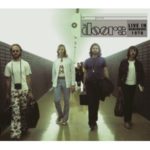Rhino
This is the sixth release that documents the Doors live performance in 1970, before the band’s world implodes and Jim Morrison subsequently gets the chance to discuss poetry with Rimbaud and Blake in the afterlife. In a warts-and-all recording Live in Vancouver 1970 sounds pretty damn magnificent considering the band’s tour manager used two mics onstage connected to a reel-to-reel to capture every minute of a two-hour performance including interminable breaks for tuning.
While the notes point out how pleased the band members felt to be in Canada, and far away from the madness of their Los Angeles homebase, they initially sound unenthused and tired on opening number “Roadhouse Blues.” It’s as if they’re fighting through the fatigue of Morrision’s erratic behavior, run-ins with the law, controversies and whatever else could be eating away at them at that moment. But “Roadhouse” has lacks the bite heard in the studio version, and reeks of contractual obligation. Quickly sliding into “Alabama Song,” “Back Door Man” and “Five To One” loosens up the gears in the foursome until they arrive at “When the Music’s Over.” The 13-plus minutes of that number allow Ray Manzarek, Robbie Krieger and John Densmore the space to dance around its groove while Morrison inhabits his role as Lizard King. It’s times like this and subsequent other epics – “Light My Fire” and “The End” – that find the group making good on their artistic ambitions and walking through those doors of perception while remaining grounded to the pure heat of rock ‘n’ roll.
Midway through the set, blues legend Albert King joins in to add slide guitar on “Little Red Rooster” and “Who Do You Love.” It presents an interesting mash up of gritty blues power with the musical palette of the Doors, particularly on “Money” and “Rock Me.” You can almost hear the members glow with excitement at the reality of playing with King. At the same time Morrison gives an indication of where his howl could have gone if he hadn’t broken on through to the other side. Krieger offers a indication to King’s appearance with a blues-infused solo during “Five to One.” Later, he incorporates a line from “My Favorite Things” into his solo during “Light My Fire.” The significance lies in the fact that the guitarist as well as his fellow bandmates didn’t rest on their recent commercial achievements. It’s a reminder that when Morrison was in the mood, he could contribute to one of the more visceral exploratory bands around at that time.




No Comments comments associated with this post